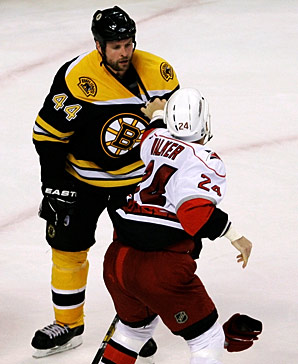
NHL's Walker ruling defies logic
What constitutes a "sucker punch" has never been high on my list of the inexplicable, either. Until now, of course.
In determining he would have to reverse the automatic suspension to Carolina's Scott Walker -- a ban that, for the record, came to be "automatic" the moment on-ice referees Brad Watson and Tim Peel wrote the transgression into their game report after Game 5 of the Boston-Carolina series -- NHL disciplinarian-in-chief Colin Campbell decided Walker's dropping his gloves and punching Boston's Aaron Ward in the face while Ward had his hands at his side and play was stopped didn't meet Campbell's definition of a sucker punch.
OK, I'll go along. I long ago stopped trying to determine the NHL's standards for supplemental discipline. But if it wasn't a sucker punch, it was still a punch to the face of a player clearly not engaged in any action, including defending himself. It also came at a point in a playoff game where rule 47.22 states: A player or goaltender who is deemed to be the instigator of an altercation in the final five (5) minutes of regulation time or at anytime in overtime, shall automatically be suspended for one game.
To the best of my reading, there is no gray area in that rule.
The on-ice officials knew how much time was left on the clock when they made their ruling. They know the definition of "an altercation," and even by the NHL's vague standards, punching a player in the face can be viewed as such. They also know the player should be suspended AUTOMATICALLY (emphasis mine).
Nowhere in the fine print does it say "unless, of course, it might require said player to miss an upcoming elimination game. We sure don't like to do that even if we'll be the laughingstock of the sporting world for reversing our own hard-and-fast rule that was put in expressly to stop this kind of thing from happening."
Still, that's what Campbell did.
Difficult to explain. Actually, it's darn near impossible.
Consider that the NHL can never reverse a call under observation by the video replay judge unless there is clear and overwhelming evidence that a mistake was made in determining whether and how a puck crossed the goal line. That provision is in there for the most logical reason: to remove all doubt about the integrity of the process. Yet Campbell, without clear or overwhelming evidence to the contrary, reversed the decision of two on-ice officials because he determined the blow to Ward's face did not reach the level of "a sucker punch."
Even if there was a clear definition of a "sucker punch" in the rule book, what does it matter? Ward, a veteran NHL player who knows what can happen if he is goaded into doing something he doesn't want to do at a pivotal point in a game, kept his gloved hands to his sides as Walker skated up to him, grabbed a handful of his jersey and threw a right to his face. If that's not a clear intent to start something -- oh, say, an altercation -- doesn't it at least rise to intent to injure? And if it does -- and it says here it does without a shadow of a doubt -- what gives Campbell the right to overrule the officials on the ice?
It's not like Campbell is claiming nothing happened. Heck, he fined Walker $2,500, the maximum allowed by the collective bargaining agreement. Clearly, what happened was not only in violation of the rules but also worthy of supplemental discipline. Campbell apparently just felt it didn't rise to the level of what is an automatic and no-discretion-allowed rule. The ramifications of that are over the top even by NHL standards.
If that power is allowed to stand, Campbell could set himself up to be judge, jury and even executioner on all matters related to on-ice behavior. In doing so, he also sets himself up to be something less than fair and impartial. It means he could decide that a punch in the head during the Philadelphia-Pittsburgh series is different than a punch in the head during the Calgary-Chicago series (oh, wait, he already did that).
Or he could determine Walker wasn't trying to instigate an altercation because it didn't qualify as a sucker punch but still did something that warranted a $2,500 fine. (Oh, well, he's done that now, too).
So, what's next? A ruling that says a player who doesn't protect or defend himself actually invites a second punch in the face because he's refused to honor the code? A determination that sets in stone that talking trash about an ex-girlfriend is worthy of a six-game suspension, but hammering a player head-first into the boards from behind is "part of the game" (and, by the way, that's been done, too)?
And is it too far a leap to suggest "rules don't matter" is the norm in this league?
I've always wanted to say no, but seeing the Flames play the last week of the regular season while dressing fewer players than the rules allow in an effort to stay under the salary cap, and getting a pass from the league to do so, makes any sensible person think otherwise.
If any of the above were a one-, two- or even three-time occurrence in the NHL, one could perhaps look the other way. The fact is, though, that these are everyday, business-as-usual events. And that's a big part of the reason why it's become impossible to take this league seriously.
On ice, in the court room and especially in the court of public opinion.




